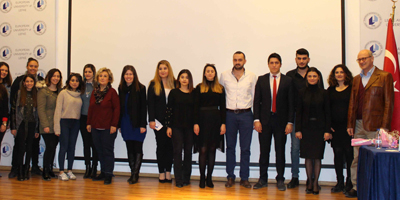“Children during and after a divorce” discussed at EUL

“Children during and after a divorce” themed panel was organized by European University of Lefke (EUL) Student Denary and Social Services Club at EUL. Lawyer Aslı Murat and Social Worker Hüseyin Bostancı made presentations within the scope of panel.
Murat pointed out that in the Judicial System of TRNC, 1/98 numbered Family Marriage and Divorce act is the act that settles matters of marriage and divorce and added that aforesaid act was included in the judicial system in 1988. Murat said that the law brought important changes at the time, particularly in matters such as surnames that women have after marriage and property sharing after divorce.
Pointing out that 1/98 numbered act was used for a long time, Murat said that, “Nowadays, the need for re-observance of the situation has arisen and with the efforts of organizations related with women’s and children’s rights, the act have been changed in the Parliament in 2015,”
Murat touched upon the surname issue after the divorce and said that, “If the parties agree, the surname of the one party becomes family surname. In this case, the other party can use their surname before the surname. If the parties fail to comply, the declaration made during the marriage notification may only be used to indicate that they will use their last name. If the parties agree, the family name passes to the child. However, the other party may also pass on their own surname to the child. First the mother and then the father’s surname are passed. There is a single surname usage right. The child can have up to two surnames. A child over the age of 18 can apply to the court and change the current situation.”
Bostancı: The effect of the divorce on children depends on the memories that happened before the divorce
Pointing out the similarity of reactions and needs of children who are of the same age and development period, Bostancı said that the effect of the divorce on the children depends on the age, sex, relations with the parents, the memory of the divorce, and the way the parents talk about divorce. Speaking about the child-parent activities that can be carried out during the divorce process, Bostancı stated these activities as; listing technique, a grabbing work and exhibiting love with expressions.
Bostancı also stated that the working units of the social worker are family courts, juvenile / juvenile high criminal court, execution offices (child admission), assize courts and forensic chambers (UNICEF).
Bostancı talked about the duties of the social workers in Turkey during and after the divorce and said that in the divorce process, social workers use the role of mediation to help the parties understand the situation they are in, and they help the parties to negotiate, to reconcile differences, or to reach a satisfactory agreement for both sides. Bostancı pointed out that social workers conduct follow-up work to monitor child’s adaptation to changing life after the divorce and ended his speech by pointing out that during and after the divorce, social workers act in line with “the best interests of the child” principle.
